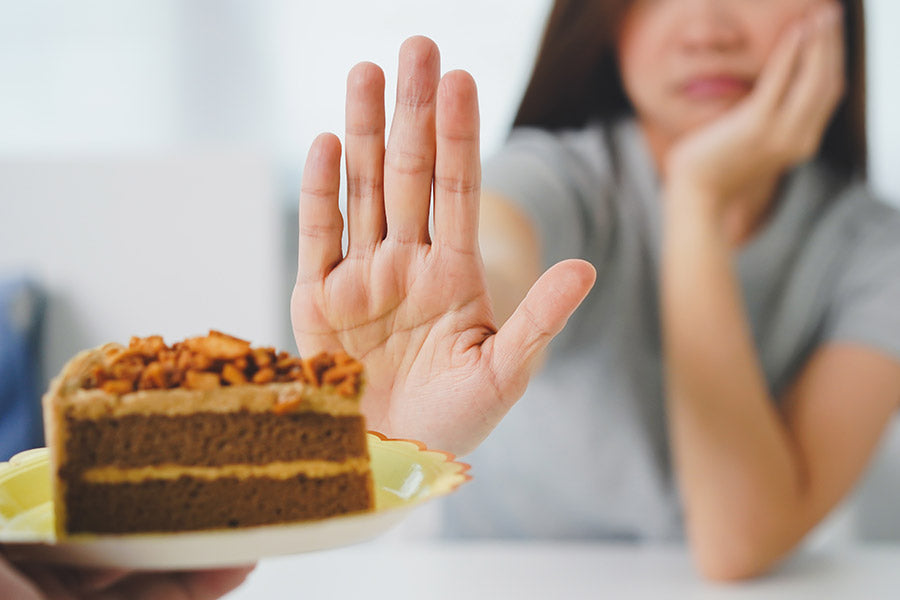Are you working hard to gain muscle but struggling to eat enough? As you all know, if you want to pack on some serious muscle mass, you must have a hearty appetite. Unfortunately, not everyone is blessed with an innate hunger for food – myself included.
You're not alone. Many people find it difficult to increase their appetite naturally. In this post, we'll share some tips that can help. Follow these simple tips to ensure your body gets the right nutrition to grow muscle. Before discussing the appetite-increasing tips, let's get a few important things straight:
The Difference Between Appetite and Hunger
It's common to use the terms "appetite" and "hunger" interchangeably, but they describe two different things. Appetite is the desire to eat, and hunger is the physical need for food. A complex system of hormones regulates both appetite and hunger, but other factors can contribute, too, like emotions and stress levels.
Appetite is mostly determined by psychological factors, such as what you see and smell. For example, you might feel like eating ice cream after seeing a commercial for it on TV. The sight and smell of food can trigger feelings of desire or pleasure that lead to increased appetite.
On the other hand, hunger is mainly controlled by hormones that signal the body to start digesting food. These hormones are released in response to an empty stomach or a drop in blood sugar levels. So, if you're eating because you're hungry or have a strong appetite for something, pay attention to your body's signals.
If you're unsure whether you're hungry or want to eat because it sounds good, try waiting a few minutes to see if the feeling goes away. If you're still thinking about food after a short break, it's probably hunger and not just an idle craving.
Related Article: How to Lose Weight Naturally
Common Causes of a Poor Appetite
Poor appetite is a symptom resulting from many underlying causes. It is important to evaluate other signs and symptoms, along with poor appetite, to help determine the underlying cause.
Some common causes of poor appetite include viral or bacterial infections, medication side effects, anorexia, psychological factors, and thyroid issues. Sometimes, a long-term health condition also leads to chronic low appetite.
Infections like the flu or a stomach virus can cause poor appetite as the body's energy is directed toward fighting the infection. Medications such as steroids or chemotherapy drugs can also cause poor appetite.
Anorexia, both due to aging and psychological factors, can lead to a decrease in appetite. A poor appetite can be a symptom of an underactive thyroid. The thyroid is a neck gland that produces hormones that regulate the body's metabolism. If the thyroid isn't working properly, it can cause various symptoms, including fatigue, weight gain, and decreased appetite.
And finally, alcohol dependence also causes low appetite. When you're dependent on alcohol, you may not feel like eating or vomiting after drinking. Alcohol also interferes with the absorption of nutrients, which can lead to weight loss and malnutrition.
With alcohol dependence, all the systems that signal the body to consume food become addiction-focused leading to you craving a drink every time you need food for energy, leading to even more weight loss and malnutrition. If you're struggling with alcohol dependence, it's important to seek professional help. You can overcome your dependence and regain a healthy appetite after proper treatment.
Best Natural Methods to Stimulate Appetite
Here are some great natural methods to increase diet and allow more food in for muscle building.
Consume More MCT Oil
Research suggests that spiking coffee with MCT oil may increase appetite by stimulating the release of ghrelin, the hunger-promoting hormone. Caffeine is also a well-known appetite stimulant, so starting the day with this energizing drink can be a great way to dial up your intake of nutrient-dense calories while also stoking your appetite for the rest of the day.
MCT Oil is full of medium-chain triglycerides that are excellent for metabolism and potentially good for digestive health. Unlike other oils that can leave you feeling sluggish, the short-chain fats in MCT oil digest quickly and help to fuel energy.
You can put it in something other than coffee, too. Adding a spoonful or two to shakes, salad dressings, or cereal is an easy way to add a few extra calories to bulk up dishes.
Use Water to Your Advantage
Drinking a glass of water just before eating is a perfect weight-loss strategy. Water fills up the stomach, helping you feel fuller faster. This means you will naturally eat less food overall, losing weight.
Additionally, drinking water before meals boosts metabolism and facilitates digestion. However, if you are trying to bulk up and build muscle mass, you should drink water after eating instead of before. Drinking water on a full stomach can help to stretch the stomach and prepare it for more volume over time.
This is important if you slowly increase your caloric intake to bulk up. Overall, drinking water before or after meals is a personal decision based on your individual goals. Consider adding hydration supplements into your routine.
Eat More Often
Eating more often may seem counterintuitive if you're trying to stimulate your appetite, but it can help. When you're not eating regularly, your body goes into starvation mode and starts to hold on to calories, making you feel less hungry.
Eating smaller meals or snacks every few hours can help to keep your metabolism going and prevent your body from going into starvation mode. In addition, foods that are high in protein and fiber can help increase feelings of fullness and reduce cravings. So, when struggling to stimulate your appetite, try eating more frequently throughout the day.
Get a Bigger Plate
Small changes matter a lot. For example, changing your plate can be a big step towards raking your appetite. Digesting a lot of food can be overwhelming, but you can deceive your brain into believing you're not as famished by portioning your meals on a bigger plate.
Research reveals that even small increases in the size of the container people use to eat leads them to consume more without realizing it. Thus, try dishing up meals on your biggest dinner plate and observe if it becomes simpler to achieve your daily calorie goals.
Try Cannabis
Though often overlooked, appetite is an important bodily function. Appetite is regulated by hormones like ghrelin and leptin, which signal to the brain when the body needs more energy. For some people, these hormones can become imbalanced, leading to decreased appetite.
This can be a problem for people trying to gain weight or those who need to maintain weight for their health. Cannabis has been shown to increase levels of ghrelin, which can help stimulate appetite. As a result, cannabis may be an effective treatment for people struggling with a decreased appetite.
Drink Your Calories
Drinks are the easiest way to add a huge load of calories to your diet without feeling like it. Drink fruit juices with your meals to give your calorie count a head start. Bulking up your calorie bank with protein shakes made with nutrient-dense ingredients like MCT oil, coconut milk, nut butter, or avocados is a great option too. You can gulp down a massive amount of calories in one go without much effort.
Keep Up With Exercise
Many people who struggle with weight also struggle with their appetite. They may not feel hungry or full after only eating a small amount of food. This can make it difficult to get the nutrients your body needs, leading to weight gain.
However, new research suggests that exercise may help regulate the hormone ghrelin, which is responsible for stimulating appetite. In one study, participants who started an exercise program not only lost weight but also reported feeling hungrier and eating more. This suggests that exercise could be a helpful tool for managing appetite and weight.
Avoid Fiber
When trying to lose weight and burn fat naturally, you'll usually find information supporting higher fiber intake. When it's about gaining weight, you need to avoid fibrous foods that tend to make you feel fuller with even negligible intake.
If you're having trouble consuming enough food because you feel full too quickly, decrease your fiber intake. Fiber-rich foods include brown rice, whole grains, and some fruits and vegetables such as broccoli and peas.
Instead, focus on eating white rice, sourdough bread, lower-fiber fruits like bananas and watermelons, skinless potatoes, etc.
Make Meals a Social Occasion
One fun way of eating more is to eat with friends, family, or anyone you like. Research suggests people eat more when distracted by something, be it company or TV. Being surrounded by your favorite people makes you happy, and happiness can trick your mind into a party mode, leading to increased intake.
Invite your friends over and eat in a festive environment; you'll eat more unconsciously and even feel happy about it.
Related Article: Bulking Vs. Cutting: Best Way to Build Muscle
FAQs
1. What vitamin can increase appetite?
A lack of appetite can be due to many factors, including stress, illness, and certain medications. If you are struggling to have an appetite, zinc and vitamin B1 supplements may help. Zinc is involved in many enzymatic reactions in the body and is necessary for a healthy immune system.
It can be found in meat, poultry, seafood, nuts, and legumes. Vitamin B1 is essential for energy production and metabolism. It is found in pork, legumes, fortified cereals, and fish oils. If you are interested in taking zinc or vitamin B1 supplements to increase your appetite, talk to your healthcare provider to see if they are right for you.
2. What causes a weak appetite?
Negative emotions like sadness, depression, anxiety, grief, or stress can decrease appetite. So can eating disorders such as anorexia nervosa.
3. What to eat if you have no appetite?
Adding nutrient-rich foods to your diets, like yogurt, cheese, and whole-grain bread, can help you feel nourished. Topping these items with avocado, cottage cheese, or nut butter is a great way to get even more nutrients.
Drinking milk-based beverages like plain or flavored milk regularly can also help improve your health. And finally, be sure to stay hydrated by drinking water throughout the day.
Summary
If you're looking for ways to increase your appetite naturally, follow the tips mentioned in this article. Although various factors can cause a poor appetite, there are several things you can do to stimulate your appetite.
From consuming more MCT oil and cannabis to keeping up with exercise and making meals a social occasion, many natural methods can help improve your appetite. Try out some of these suggestions and see which ones work best.
Reading List
Gain Lean Muscles: Workout, Nutrition Plan & More
Weight Loss Vs. Fat Loss: What's the Difference?
Article Sources
- Jeong, Ji Na. ‘Effect of Pre-Meal Water Consumption on Energy Intake and Satiety in Non-Obese Young Adults’. Clinical Nutrition Research, vol. 7, no. 4, 2018, p. 291. DOI.org (Crossref), https://doi.org/10.7762/cnr.2018.7.4.291.
- Kawai, Keisuke, et al. ‘Ghrelin Activation and Neuropeptide Y Elevation in Response to Medium Chain Triglyceride Administration in Anorexia Nervosa Patients’. Clinical Nutrition ESPEN, vol. 17, Feb. 2017, pp. 100–04. ScienceDirect, https://doi.org/10.1016/j.clnesp.2016.10.001.
- Marchiori, David, et al. ‘Container Size Influences Snack Food Intake Independently of Portion Size’. Appetite, vol. 58, Jan. 2012, pp. 814–17, https://doi.org/10.1016/j.appet.2012.01.015.
- MD, Howard E. LeWine. ‘Distracted Eating May Add to Weight Gain’. Harvard Health, 29 Mar. 2013, https://www.health.harvard.edu/blog/distracted-eating-may-add-to-weight-gain-201303296037.
- Riggs, Patricia K., et al. ‘A Pilot Study of the Effects of Cannabis on Appetite Hormones in HIV-Infected Adult Men’. Brain Research, vol. 1431, Jan. 2012, pp. 46–52. PubMed Central, https://doi.org/10.1016/j.brainres.2011.11.001.
- Vatansever-Ozen, Serife, et al. ‘The Effects of Exercise on Food Intake and Hunger: Relationship with Acylated Ghrelin and Leptin’. Journal of Sports Science & Medicine, vol. 10, no. 2, June 2011, pp. 283–91. PubMed Central, https://www.ncbi.nlm.nih.gov/pmc/articles/PMC3761859/.











